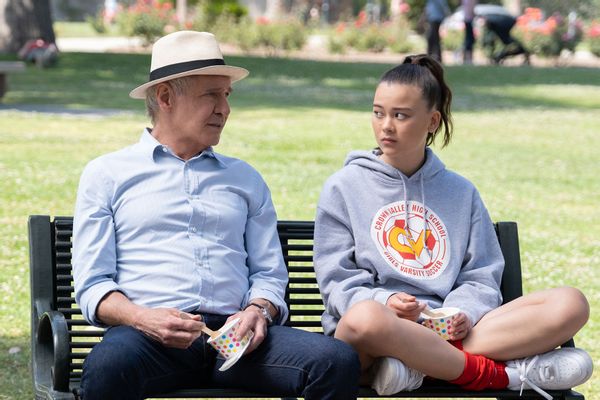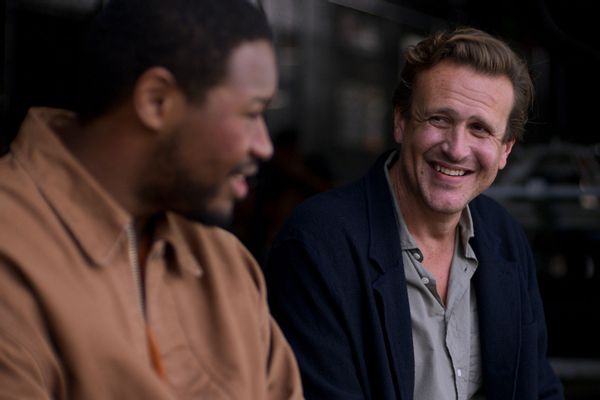
Jimmy's wreck of a personal life is the main attraction. The ethical purity of his therapeutic methods is secondary, if that.
For many of us, television provides our first exposure to the world of work. This can be beneficial, especially when children's programs include glimpses of visits to the doctor's office, farms, or fire stations to spark curiosity, dispel mystery or reduce any fear associated with those places.
Still, it's natural to have mixed feelings about seeing your occupation portrayed on TV, especially when it's rendered poorly or unrealistically. This informs some of the conversation surrounding "Shrinking," The Apple TV+ comedy starring Jason Segel as Jimmy Laird, a psychologist mired in compassion fatigue.
One day he loses his patience with Grace ("Saturday Night Live" star Heidi Gardner), one of his regulars who is trapped in an emotionally abusive marriage. Instead of asking Grace for the millionth time how her spouse's latest belittlement makes her feel, Jimmy erupts with an ultimatum: leave her husband, or he'll terminate their therapy.
When she accepts his demand, Jimmy views this as evidence that his direct "psychological vigilante" style is working. He pushes his luck further when another patient, a military veteran named Sean (Luke Tennie), comes to him with explosive anger issues. Instead of relying on talk therapy, he takes Sean to a mixed martial arts gym where he can unload his rage on a consenting opponent.
Nobody in Jimmy's professional circle thinks this is a good idea. His mentor and boss Phil (Harrison Ford) is deeply alarmed. His colleague Gaby (Jessica Williams) who, like Phil, is a by-the-book practitioner, looks on with giddy nervousness, waiting for the other shoe to drop.
But whether Jimmy's unconventional approach to his job works is ultimately neither here nor there, since that's not why the typical viewer is watching. Jimmy's wreck of a personal life is the main attraction. The ethical purity of his therapeutic methods is secondary, if that.
When he's not counseling fragile clients, Jimmy is barely holding it together. We first meet him midway through an Adderall binge that has him up at 3 a.m. and loudly partying with sex workers. From there we discover he's recently lost his wife, and has abandoned his daughter Alice (Lukita Maxwell) to be raised by his next-door neighbor Liz (Christa Miller) and her husband Derek (Ted McGinley). Liz asks him, seriously, if this is how he's going to be from now on. He answers that he doesn't know.

Wounded healers are compelling. That's why there are so many of them. "Nip/Tuck," "House, M.D." and the messiest doctors on "Grey's Anatomy" hook us with their private drama. On the other hand, those shows can set inaccurate expectations concerning a vocation's standards or common practices.
The same can be said about any profession adapted for TV in a way to maximize conflict and tension. Ask a journalist how accurately writers fictionalize the fourth estate, and you'll get a rant about Hollywood's predilection for scripts with reporters sleeping with sources or betraying sources (up yours, Trent Crimm of The Independent!) or misrepresenting the power they wield, or agonizing over laughably thin workloads.
Therapists can probably relate in some ways, although the medium has historically been kinder to them – and this is said with the full awareness that among television's noteworthy mental health professionals is Hannibal Lecter of NBC's "Hannibal."
But in the main, TV's therapists are unsung heroes, even if they overstep their boundaries, as Robin Weigert's doctor does in the first season of "Big Little Lies," or enable their clients' malevolence, as Dr. Melfi does in "The Sopranos." Sometimes the problem is that they're too good at their job, which seals the fate of Steve Carell's psychotherapist Alan Strauss in "The Patient."
They can also be empathetically flawed, as "In Treatment" depicts its shrinks in both Gabriel Byrne's version and Uzo Aduba's fourth season depiction of Dr. Brooke Taylor. Relatedly, both therapists overlap their personal spaces with their professional environment; it can't be much of a surprise to see them grow uncomfortably close to their clients.
Obviously I am not a therapist. I merely happen to share my life with one. My husband's professional inspiration is Robert Hartley, the counseling hero of "The Bob Newhart Show." Like Newhart's therapist, my spouse maintains a very strict line between his work and personal life. That means we often watch TV in separate rooms.
See, the dramas people commonly think of as some of the best of all time – "Breaking Bad," "Mad Men" and "The Shield" being examples – feel too much like work wandering into his down time. It isn't that his clients are meth kingpins, emotionally stunted advertising executives or violently corrupt cops. He just deals with those types of personalities and counsels the people they damage all day long.
"Shrinking," he can handle. Although the main character shares his profession, my husband views Jimmy's therapist cred with a similar seriousness to what meteorologists might assign to Thor.
We watched a few episodes together at my request. I was hoping he'd provide me with a sense of how well or badly the show depicts the work life of a therapist. But after a few breakdowns of which ethical lines he crossed, he dropped the assignment cold the moment Sean moves in with Jimmy. "OK, we're in fantasy land now," he said.
My husband views Jimmy's therapist cred with a similar seriousness to what meteorologists might assign to Thor.
Situations like Sean's and Jimmy's have happened, to be clear. My spouse can verify that because a number of those cases end with such spectacular disaster that they make 11 o'clock newscast headlines. Since "Shrinking" is a sitcom from the executive producer of "Ted Lasso," Bill Lawrence, and created by one of its stars, Brett Goldstein, Jimmy probably won't end up on "Dateline."
At least, not for letting a patient stay in his pool house.

Still, a layperson can't be faulted for wondering how Jimmy ranks as a therapist, and several reporters have consulted professionals for their insights. I'd like to gently suggest, however, that his professional quality rating matters less than what he represents in a time where therapy is at long last being more broadly accepted as necessary health maintenance.
Therapy plays a central role in the second season of "Ted Lasso," which may lend a level of trust to "Shrinking" since a number of the same people are behind it. Where it gets sticker is the implied stakes of Jimmy's work family, as in Phil and Gaby – and now, Sean – being an extension of his main family unit, which includes Liz, Derek and Jimmy's best friend Brian (Michael Urie).
All of them know how extensively Jimmy's grief has screwed him up. They're also participants in the lack of division between Jimmy's work life and his personal life, something that his new "psychological vigilante" approach styles as an asset. In the real world, it is not.
But Jimmy's mistakes-in-progress and parallel efforts to mend his life remind us that we don't often consider the ways our therapists carry their work with them. Our damage can become theirs if they're not mindful in the way they process it.
"In Treatment" hints at that toll via Dr. Taylor's struggle with sobriety, a shadow Dr. Sharon Fieldstone (Sarah Niles) also tangles with on "Ted Lasso." But Ted only finds this out when circumstances force him to deliver Dr. Sharon home after she's injured; she never plans on allowing anyone to see her extensive booze collection.
Jimmy's rock bottom informs his climb out of his depressive valley, and he carries his patients' anguish with him – the standard clinician's burden. As long as a viewer understands that this is not how therapy is supposed to work, Jimmy's personal improvement story drives the focus, not necessarily how well he does his job.
"I'd probably say that I view 'Shrinking' akin to how cops may see the policing in 'Brooklyn Nine-Nine,'" my in-house therapist said in review. I pointed out that cops probably love "Brooklyn Nine-Nine." Does he feel that way about "Shrinking"?
Not really. "For me," he said, "it lives on the comedy scale someplace between 'Cheers' and . . . what was that show where Steve Carell died in a basement?"
In case you're wondering, he couldn't bring himself to watch that one either.
New episodes of "Shrinking" stream Fridays on Apple TV+.







